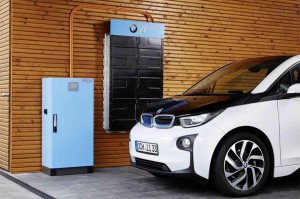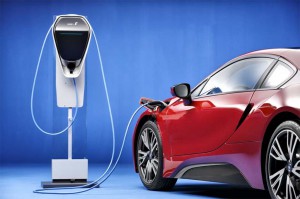BMW is launching a new stationary storage system that will use the same batteries found in its i3 electric city car.
What BMW is calling an “intelligent storage solution” can be integrated into a broader home or office clean energy system, not only providing power during a blackout but also storing wind or solar energy for use when power demands peak.
“The remarkable advantage for BMW customers in using BMW i3 batteries as a plug and play storage application is the ability to tap into an alternative resource for residential and commercial backup power, thus using renewable energy much more efficiently, and enabling additional revenues from the energy market,” Cliff Fietzek, Manager Connected eMobility at BMW of North America, said ahead of the system’s debut at the EVS29, the annual electric vehicle conference held this year in Montreal.
The system is being offered in both 22 kilowatt-hour and 33 kWh configurations, enough to cover the needs of an average home or small office should power be disrupted for as long as 24 hours.
(All new German cars must be emission free by 2030. For more, Click Here.)
Developed in partnership with Germany’s Beck Automation, the system is, on the surface, similar to battery back-up devices that have been developed by several other automakers, notably Daimler AG and Tesla Motors. The latter maker’s Powerwall system uses individual batteries similar to those in the Tesla Models S and X electric vehicles, but BMW actually is relying on an entire battery pack developed for the i3 EV.
And unlike Daimler’s system, the BMW backup package can be equipped with either brand new batteries or with a used i3 pack, something the German automaker calls “2nd Life Batteries.” Experts estimate that even after an electric vehicle like the i3 is ready for the scrap yard its batteries will typical retain at least 60% to 70% of their original capacity – but at a sharply reduced cost.
BMW has run several pilot programs to test out the battery backup concept, working with energy suppliers PG&E and NextEra. It is expected to find similar partners once the production system is available for retail sale.
(Click Here for details about why LA city workers are getting 100 BMWs.)
The maker did not disclose timing or pricing for the system it has developed with Beck. Tesla’s smaller 6.5 kWh Powerwall currently goes for $3,000 plus installation charges.
Many energy analysts see backup power systems as a major growth market. The technology can serve as an alternative to traditional backup generators. It can help customers load level – storing energy during off-peak hours when it is cheaper to buy and then use it during costlier, high-demand periods. It also can store energy from solar cells and other renewable sources that aren’t always consistent.
Some analysts believe that whole “farms” of batteries could be created by utilities to load level and reduce the risks of black and brownouts. An alternative would have smaller clusters of batteries stationed at various points along the electric distribution grid.
(BMW updates i3, boosts range. Click Here to check it out.)
Other automakers, including Nissan and General Motors, are also expected to enter the stationary power market. They see these systems as a way to make use of all the batteries they expect to bring back as sales of plug-in hybrid and pure battery-electric vehicles grow over the coming decades. That could reach into the millions of packs a year, by some estimates, in the 2030s and beyond.


